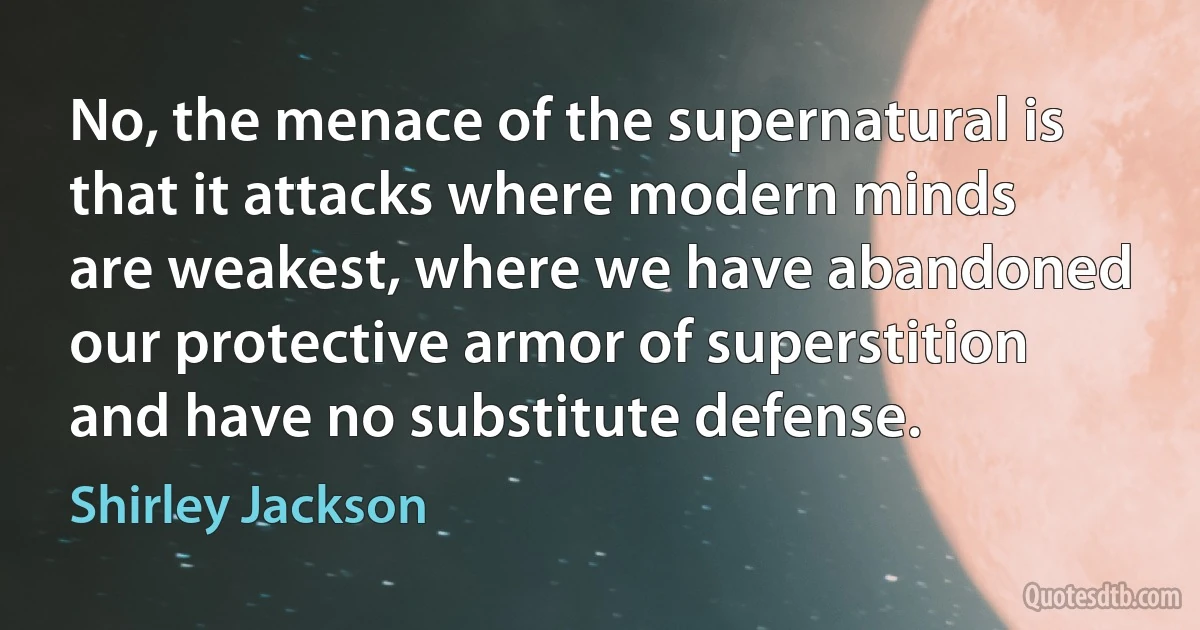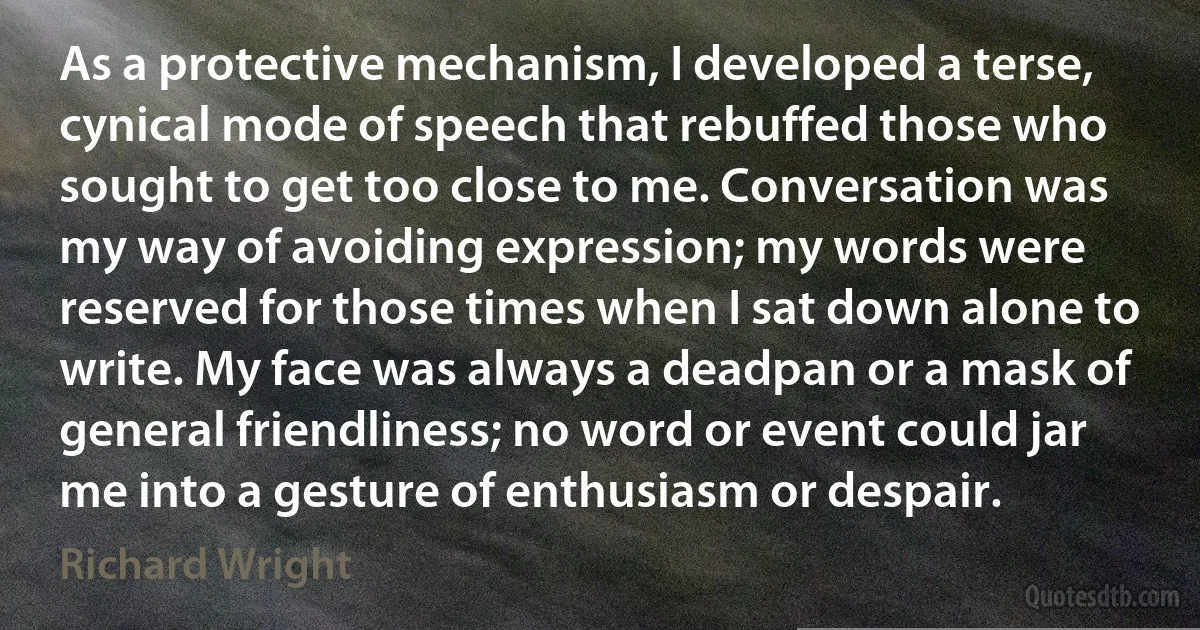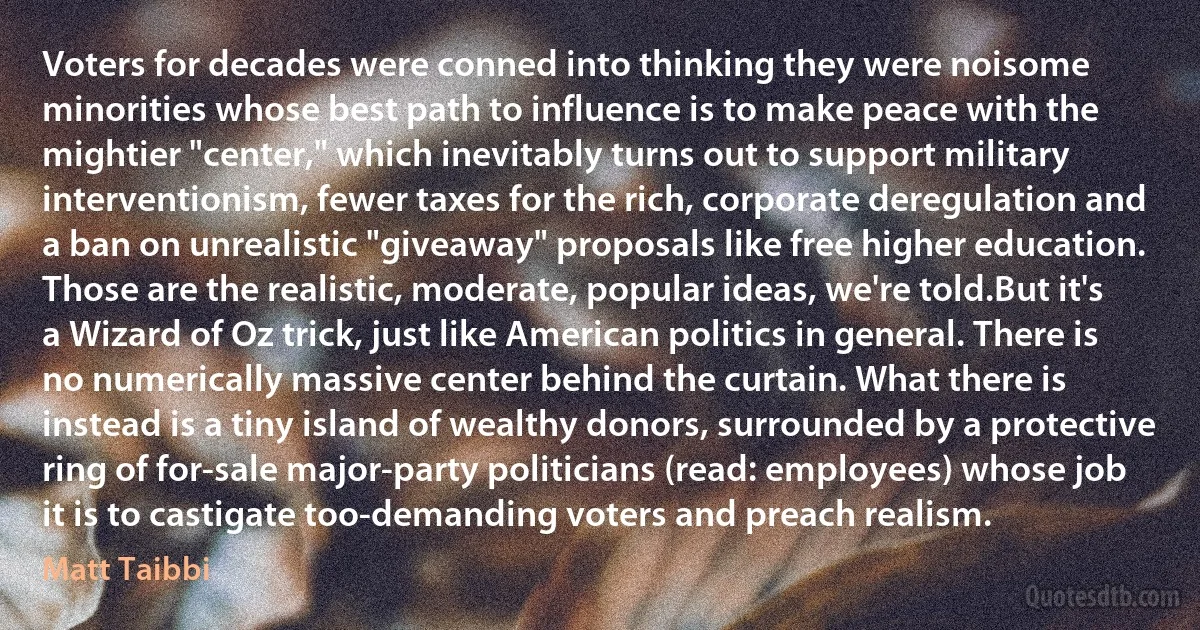Protective Quotes - page 3
"Your concept is a tremendous network of inconsistencies.”
"In what way?” the countess said, not very much interested.
"It seems to be based on reverence for the young, and an extremely patient and protective attitude toward their physical and mental welfare. Yet you make them live in these huge caves, utterly out of contact with the natural world, and you teach them to be afraid of death-which of course makes them a little insane, because there is nothing anybody can do about death. It is like teaching them to be afraid of the second law of thermodynamics, just because living matter sets that law aside for a very brief period.

James Blish
I have a lot of respect and admiration for Anthony Rapp as an actor. I'm beyond horrified to hear his story. I honestly do not remember the encounter, it would have been 30 years ago. But if I did behave then as he describes, I owe him the sincerest apology for what would have been deeply inappropriate drunken behavior, and I am sorry for the feelings he describes having carried with him all these years. This story has encouraged me to address other things about my life. I know that there are stories about me and that some have been fueled by the fact that I have been so protective of my privacy. As those closest to me know, in my life I have had relationships with both men and women. I have loved and had romantic encounters with men throughout my life, and I choose now to live as a gay man. I want to deal with this honestly and openly and that starts with examining my own behavior.

Kevin Spacey
Whenever anyone has called me a bitch, I have taken it as a compliment. To me, a bitch is assertive, unapologetic, demanding, intimidating, intelligent, fiercely protective, in control - all very positive attributes. But it's not supposed to be a compliment, because there's that stupid double standard: When men are aggressive and dominant, they are admired, but when a woman possesses those same qualities, she is dismissed and called a bitch.These days, I strive to be a bitch, because not being one sucks. Not being a bitch means not having your voice heard. Not being a bitch means you agree with all the bullshit. Not being a bitch means you don't appreciate all the other bitches who have come before you. Not being a bitch means since Eve ate that apple, we will forever have to pay for her bitchiness with complacence, obedience, acceptance, closed eyes, and open legs.

Margaret Cho
Some employees in slaughterhouses, she notes, rapidly develop a protective hardness and start killing animals in a purely mechanical way: "The person doing the killing approaches his job as if he was stapling boxes moving along a conveyor belt. He has no emotions about his act.” Others, she reveals, "start to enjoy killing and... torment the animals on purpose.” Speaking of these attitudes turned Temple's mind to a parallel: "I find a very high correlation,” she said, "between the way animals are treated and the handicapped.... Georgia is a snake pit-they treat [handicapped people] worse than animals.... Capital-punishment states are the worst animal states and the worst for the handicapped.” All this makes Temple passionately angry, and passionately concerned for humane reform: she wants to reform the treatment of the handicapped, especially the autistic, as she wants to reform the treatment of cattle in the meat industry.

Oliver Sacks
I don't use the word 'pet.' I think it's speciesist language. I prefer 'companion animal.' For one thing, we would no longer allow breeding. People could not create different breeds. There would be no pet shops. If people had companion animals in their homes, those animals would have to be refugees from the animal shelters and the streets. You would have a protective relationship with them just as you would with an orphaned child. But as the surplus of cats and dogs (artificially engineered by centuries of forced breeding) declined, eventually companion animals would be phased out, and we would return to a more symbiotic relationship - enjoyment at a distance.

Ingrid Newkirk
So long as an individual, whether person or state, has only his own arms to depend upon in order to defend his rights by arms, then he must be stronger than anyone likely to challenge those rights. Which means that that other is deprived of similar defense. Within the frontiers man long ago made the discovery that the only way out of that dilemma is for the community, by putting its combined power behind a protective law, to assume the defense of the individual. Defense must be a communal, a collective function, or it cannot exist effectively at all.

Norman Angell
I'm afraid not. According to the law, you must leave here at once.”
"But they'll kill me!”
"That's very true,” Frendlyer said. "Unfortunately, it can't be helped. A victim, by definition, is one who is to be killed.”
"I thought this was a protective organization.”
"It is. But we protect rights, not victims. Your rights are not being violated.

Robert Sheckley
My parents were kind of over protective people. Me and my sister had to play in the backyard all the time. They bought us bikes for Christmas but wouldn't let us ride in the street, we had to ride in the backyard. Another Christmas, my dad got me a basketball hoop and put it in the middle of the lawn! You can't dribble on grass.

Jimmy Fallon
We lost 2 great friends and patriots today. Berke and Jay will be greatly missed. TY for your service to VA.
We are deeply saddened by the loss of Jay and Berke, both of whom were our close friends and trusted members of our team. Jay has flown us across the commonwealth for more than three and a half years. Berke was devoted to our entire family as part of our Executive Protective Unit team for the past three years.
This is a devastating loss for their families, the Virginia State Police, and the entire commonwealth. Out hearts go out to their wives and children, and we stand by to support them during this difficult time. These heroes were a part of our family and we are simply heartbroken.

Terry McAuliffe
Each year at springtime scores of people on snowmobiles crash through the melting ice on the lakes of Minnesota and drown. Pressure is mounting on the new governor to pass a protective law. He, the former wrestler and bodyguard, has the only sage answer to this: "You can´t legislate stupidity."

Werner Herzog
I hear America sometimes playfully accused of sending you all your storms, and am in the habit of parrying the charge by alleging that we are enabled to do this because, in virtue of our protective system, we can afford to make better bad weather than anybody else. And what wiser use could we make of it than to export it in return for the paupers which some European countries are good enough to send over to us who have not attained to the same skill in the manufacture of them?

James Russell Lowell
...as I worked with the unionized labor, of the much larger labor force that was outside the purview of the protective labor laws, of any form of social security, access to justice, access to financial services, anything. That tugged at my heart. And those people were unorganized and had no strength to act to seek remedies.

Ela Bhatt
They're a migratory tribe, so you find them everywhere [...] They're hardy, longevitous, resistant to infection by disease or new ideas, little modified by regional influences. The accent drifts a bit, maybe. The dialect adapts itself to the local patois: but that's a chameleon's trick: protective colouring, no more. The rest of it, the sinuous mind, the easy passion, the leery eye, the ready smile, the fine, swaggering, billycock-and-shillelagh walk, the flexible moralities, the bel canto oratory, the black bilious angers, these never change.

Morris West
The preservation of freedom is the protective reason for limiting and decentralizing governmental power. But there is also a constructive reason. The great advances of civilization, whether in architecture or painting, in science or literature, in industry or agriculture, have never come from centralized government. ... Government can never duplicate the variety and diversity of individual action.

Milton Friedman
If we observe the aging of individuals, in the period after middle life, it seems to me that we can distinguish three ideal-typical outcomes. Some individuals bear within themselves some psychological sources of self-renewal; aging brings for them accretions of wisdom, with no loss of spontaneity and ability to enjoy life, and they are relatively independent of the culture's strictures and penalties imposed on the aged. Other individuals, possibly the majority, bear within them no such resources but are the beneficiaries of a cultural preservative (derived from work, power, position, etc.) which sustains them although only so long as the cultural conditions remain stable and protective. A third group, protected neither from within nor from without, simply decay. In terms more fully delineated elsewhere, we may have autonomous, adjusted, and anomic reactions to aging.

David Riesman



